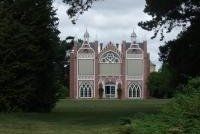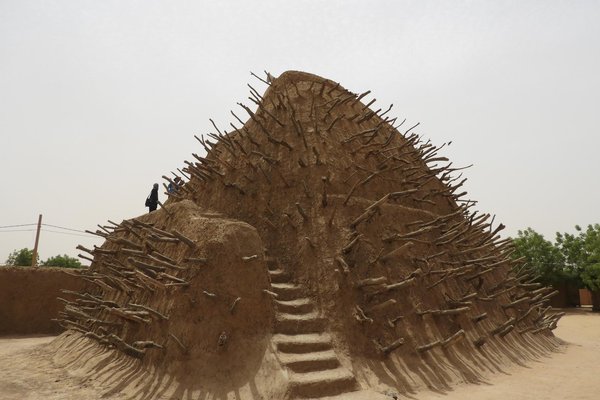Mali
Tomb of Askia
The fifteenth-century Tomb of Askia in Gao is a fine example of the monumental mud-building traditions of the West African Sahel.
It is believed to be the burial place of Askia Mohammad I, the first Emperor of the Songhai Empire, which once controlled the lucrative trans-Saharan trade from West Africa. The complex includes the pyramidal tomb, two mosques, a cemetery and an assembly ground. It receives a regular renewal of the layer of plaster, which erodes each winter.
Community Perspective: located in a region with long-standing security issues, the site has only been reviewed once so far. Werner visited on a day trip in 2011.
Site Info
Official Information
- Full Name
- Tomb of Askia (ID: 1139)
- Country
- Mali
- Status
-
Inscribed 2004
Site history
History of Tomb of Askia
- 2012: In Danger
- threatened by armed conflict & to prevent trafficking in cultural objects from the site
- 2004: Inscribed
- Inscribed
- In Danger
- threatened by armed conflict & to prevent trafficking in cultural objects from the site Since 2012
- Type
- Cultural
- Criteria
- ii
- iii
- iv
Links
- UNESCO
- whc.unesco.org
- Related
-
- afrol.com — Link
- archnet.org — ArchNet
All Links
UNESCO.org
- whc.unesco.org — whc.unesco.org/
Related Resources
- afrol.com — Link
- archnet.org — ArchNet
News Article
- Feb. 14, 2014 un.org — UN experts find 'serious damage' to cultural sites in Gao
Community Information
- Community Category
- Archaeological site: Civilizations of Sub-Saharan Africa
Travel Information
Red Zone Travel Advisory
Mali fully off-limits
Recent Connections
-
Perfect Inscriptions
2004 -
Red Zone Travel Advisory
Mali fully off-limits
-
Niger Basin
In Gao on the Niger
Connections of Tomb of Askia
- Geography
-
-
Sahel
-
Disputed territories
In Gao, claimed as their capital by the Tuareg rebels of the MNLA, as part of the nation of Azawad -
Niger Basin
In Gao on the Niger
-
- Trivia
-
-
Minority communities
Songhai -
In Video Games
Civilization VII
-
- History
-
-
Songhai Empire
Born Muhammad Toure, he took the opportunity of the death of the Songhai King in 1492 to defeat the heir (who had refused to become a Moslem) and thus make himself king. He expanded and consolidated the Empire,becoming known as "Askia the Great" (Askia = "Forceful One"). Situated in Gao - his capital -
Located in a Former Capital
Located in Gao, capital of Songhai Empire (1340-1591) -
African Kingdoms
Songhai Empire (1430s - 1591)See en.wikipedia.org
-
Trans Saharan trade routes
" bears testimony to the power and riches of the empire that flourished in the 15th and 16th centuries through its control of the trans-Saharan trade, notably in salt and gold." (AB)
-
- World Heritage Process
-
-
Perfect Inscriptions
2004
-
- Religion and Belief
-
-
Notable mosques
Complex includes 2 mosques
-
- Constructions
-
-
Pyramids
The tomb is pyramidal -
Tombs
-
Cemeteries
-
- WHS on Other Lists
-
-
World Monuments Watch (past)
Cultural Heritage Sites of Mali (2014)See www.wmf.org
-
International Coalition of Sites of Conscience
-
- Timeline
- Visiting conditions
-
-
Red Zone Travel Advisory
Mali fully off-limits
-
- WHS Names
-
-
Named after individual people
Askia Mohammad I, first Emperor of Songhai
-
News
- un.org 02/14/2014
- UN experts find 'serious damage' t…
Community Reviews
Show full reviews
We visited Gao as part of our Mali-trip in Jan 2011. For security reasons triggered by the issues between governments in the Sahel area and Sahara terrorist groups we were advised not to stay overnight in Gao, so we came early in the morning from Hombori and returned the same afternoon.
On this very day we were obviously the only travellers in Gao. We had to ask for the warden of the Askia-tomb and got it opened for us. The tomb itself (dated from 1495) is of a pyramid shape, has a very similar structure than the mosque of Djenné and is surrounded by a mosque building. The guide showed us around, we could climb the tomb and also visit the mosque for a little tip, something rather unusual for non-muslims in Mali.
The real highlight is the trip through Mali itself, a country of apparingly easy minded and extremely friendly people with a lot of interesting locations. The heritage sites add some flavour, but the country itself is definitely worth a visit.
Keep reading 0 comments
